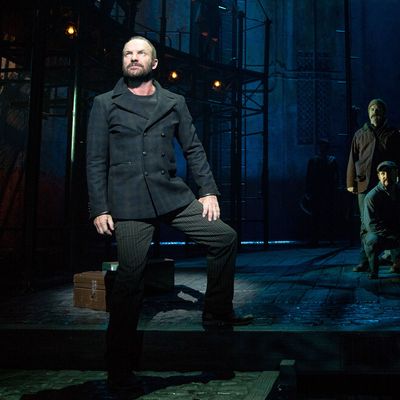
It would not ordinarily be newsworthy that a performer named Gordon Sumner took over a secondary role in a struggling Broadway musical. You do not hear much about cast changes at On the Town, for instance. But the circumstances under which Mr. Sumner, better known as Sting, joined The Last Ship last week are far from ordinary. For one thing, Sting wrote the show’s songs and conceived its story, which concerns the decimated shipbuilding industry in his own hometown of Wallsend, England. The musical is thus, for him, a labor of love, which is not to say it isn’t also a commercial venture. (His longtime manager is one of the lead producers.) After ten weeks of middling box office, with some theater mavens saying audiences were disappointed to find that the new Sting musical did not feature Sting, the unusual, though perhaps inevitable, idea of his stepping in was announced and then promoted like crazy. The resulting turnaround eerily parallels the musical’s plot, in which the desperate shipbuilders revive their spirits, if not their fortunes, by building and captaining their own anomalous vessel. The moment Sting replaced his friend Jimmy Nail in the role of Jackie White, ticket sales leapt by two-thirds.
From the number and passion of his fans in attendance at a recent performance, whooping and cawing as if to provide apt riparian sound effects, it seems the ploy has worked not just commercially but spiritually; the show now plays like a hit. Whether the boost will help The Last Ship stay afloat after Sting leaves (he’s scheduled to appear through January 24) is unclear; it’s defiantly serious-minded and makes few concessions to popularity. I still find it, as I did when reviewing the October opening, too often confused and becalmed. But on a return visit I was even more impressed than previously with the loveliness of some of the songwriting and the overwhelming beauty of the staging. For a show that spends a lot of time going nowhere, it goes there gorgeously.
None of which has anything to do with Sting’s performance. Indeed, the surprise here is that his presence doesn’t actually make much difference. The part of Jackie, the shipyard’s foreman, is not central to begin with; as played by Nail, he came across as a shadowy observer occasionally emerging from the murk to lead a song: another interesting face in an ensemble full of them. And while it’s true that Sting, even if you call him Gordon Sumner, is no one’s ensemblist — he’s a star whose starriness cannot be muffled by a beard or bulky peacoat — he’s just not onstage that much, or at the center of the plot when he is. He does sing beautifully, as you’d expect; the songs were clearly written on his own voice and always hit the sweet spots in his vocal range and sensitive-masculine demeanor. He’s never sounded better. But to the extent his charisma unavoidably pulls focus, he’s also distracting, especially when he tries to disappear in crowd scenes by stiffly doing what the common folk do. You have to love him for the effort, but haloes are hard to hide.
The Last Ship is at the Neil Simon Theatre.

